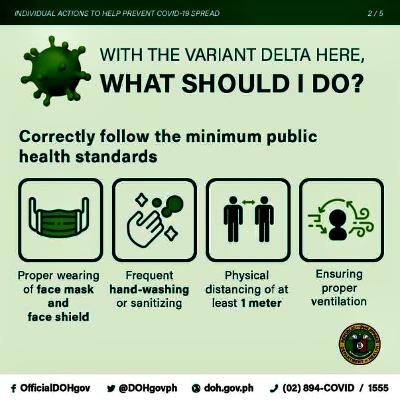 Just when Filipinos thought the pandemic would soon end, a new variant of the coronavirus disease 2019 (COVID-19) emerged. Delta, a highly contagious SARS-CoV-2 virus strain, is more deadlier than the other variants.
Just when Filipinos thought the pandemic would soon end, a new variant of the coronavirus disease 2019 (COVID-19) emerged. Delta, a highly contagious SARS-CoV-2 virus strain, is more deadlier than the other variants.
Delta variant (B.1.617.2) was first detected in India in December last year. It got its current name in May this year from the World Health Organization (WHO), which names notable variants after letters of the Greek alphabet. By April, the variant sickened more than 300,000 people per day and killed over 4,000 per day.
From India, the delta variant also swept across Great Britain. Then, it reached the United States, where it is now the predominant variant. It has also reached Asian countries, including Indonesia, Malaysia, Thailand and the Philippines.
As of August 9, there’s a total of 8 delta cases in Davao Region, according to the regional office of the Department of Health. These are in Davao City (5 cases), Davao del Norte (one in Tagum City and another one in Carmen), and Davao del Sur (one in Santa Cruz).
“The delta variant is thought to be the most contagious of all the known variants to date, with research suggesting it’s more than twice as transmissible as the original strain of the coronavirus,” wrote Denise Chow, a reporter for NBC News Science.
Delta is described by the Atlanta-based Centers for Disease Control and Prevention (CDC) as “more transmissible than the common cold and influenza, as well as the viruses that cause smallpox.” In fact, it is called “as contagious as chickenpox” in an internal document which was obtained and reported on in The New York Times.
The delta variant is bound to happen. Dr. Inci Yildirim, a Yale Medicine pediatric infectious diseases specialist and vaccinologist, wasn’t surprised by what’s happening right now. “All viruses evolve over time and undergo changes as they spread and replicate,” she explains.
But what was surprising was how quickly it spread among people. “The delta variant is more contagious than previous strains – it may cause more than twice as many infections,” the CDC claims.
According to experts, what sets delta apart is how much virus is produced by those who are infected – a measure known as viral load. This refers to how much virus is present in the body.
“A study conducted by Chinese researchers that has yet to be peer-reviewed found that people infected with the delta variant had viral loads that were up to 1,260 times higher than the viral loads of individuals infected with the original strain that circulated in 2020,” Chow wrote.
Dr. Susan Butler-Wu, a clinical microbiologist at the University of Southern California, has confirmed this. “We’ve seen through testing that people who had any other subtype of the virus. That’s a large part of what’s going to account for this enhanced transmissibility,” she told Chow.
Dr. Randal Olsen, medical director of the Molecular Diagnostics Lab at Houston Methodist hospital, is very much concerned with this turn of event. “Patients with higher viral loads are more likely to pass the virus on to other people. Also, the higher the viral load, the sicker the patient generally is.”
Another concern is that delta variant may cause more severe disease. Chow wrote: “A study published in the journal The Lancet examined the impact of the delta variant in Scotland, where it was the dominant strain. The researchers found that the risk of hospitalization from COVID-19 was roughly doubled for patients infected with delta, compared to people infected with the alpha variant, which was previously the dominant strain worldwide.”
Most of those who are highly at risk are unvaccinated and people who have not been fully against COVID-19. A study conducted in the United States showed that most patients hospitalized at UC Davis Medical Center are people who have not received the COVID-19 vaccine.
“Nationally, 97% of patients hospitalized with COVID-19 are unvaccinated,” the UC Davis Medical Center reports. “Vaccines are highly effective at preventing COVID-19 infection and are also effective in fighting against delta variant.”
Delta variant is no respecter as it also infects children and young people. “A recent study from the United Kingdom showed that children and adults under 50 were 2.5 times more likely to become infected with delta,” Dr. Yildirim says.
Experts admit that no vaccine is 100% effective. As such, fully vaccinated people can still be infected and CDC calls this as “breakthrough infections.” But this happens rarely.
“When a vaccinated person tests positive for COVID-19, most either have no symptoms or have very mild symptoms, and it rarely results in hospitalization or death,” the UC Davis Medical Center,” the UC Davis Medical Center points out. “Their symptoms are more like those of a common cold, such as cough, fever or headache, with the addition of significant loss of smell.”
Although breakthrough infections happen much less often than infections in unvaccinated people, individuals infected with the Delta variant, including fully vaccinated people with symptomatic breakthrough infections, can still transmit it to others, the CDC warns.
While they can spread the virus to others, they are infectious for a shorter period. “Previous variants typically produced less virus in the body of infected fully vaccinated people (breakthrough infections) than in unvaccinated people. However, like other variants, the amount of virus produced by delta breakthrough infections in fully vaccinated people also goes down faster than infections in unvaccinated people,” the CDC says.
The best protection against the delta variant is still vaccination, as pointed out by Kathy Katella in her feature for Yale Medicine news. “At this point, that means if you get a two-dose vaccine like Pfizer or Moderna, for example, you must get both shots and then wait the recommended two-week period for those shots to take full effect,” she writes.
Whether or not you are vaccinated, it’s also important to follow CDC prevention guidelines that are available for vaccinated and unvaccinated people. “At this time, as we build the level of vaccination, we must also use all the prevention strategies available, including masking indoors in public places, to stop transmission and stop the epidemic,” the CDC urges.
Health experts agree. “Like everything in life, this is an ongoing risk assessment,” Dr. Yildirim says. “If it is sunny and you’ll be outdoors, you put on sunscreen. If you are in a crowded gathering, potentially with unvaccinated people, you put your mask on and keep social distancing. If you are unvaccinated and eligible for the vaccine, the best thing you can do is to get vaccinated.”
Right now, the delta is the most prominent strain around the world, but the Lambda variant from South America is likewise emerging. “If people want to get back to normal, a significant portion of the population needs to be vaccinated,” the UC Davis Medical Center suggests. “As long as a chunk of people across the world are unvaccinated, new strains of the virus will continue to develop and cause problems.”






